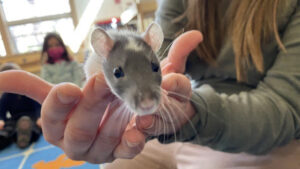The Vet is In:
Classroom Pets
Some of us fondly remember “classroom pets” from our childhood, but is it time to reconsider this under most circumstances? They can teach valuable lessons about responsibility, humane care, and compassion, but at what expense?
 These animals, especially guinea pigs, hamsters, birds, and turtles, often go home on weekends with different students, but who knows what those homes provide and may be inappropriate, even dangerous. Are there other children in the house who may not be old or educated enough to handle these animals? What kind of supervision will they have? If there is an injury to the pet – possibly by another animal in the house – will veterinary care be provided? Lame “pocket pets” have come to the veterinarian having suffered a fractured limb, undiagnosed for days with excruciating pain. Is there a chance of the animal accidentally escaping? And will there be unsuitable treats given, or feeding done on schedule?
These animals, especially guinea pigs, hamsters, birds, and turtles, often go home on weekends with different students, but who knows what those homes provide and may be inappropriate, even dangerous. Are there other children in the house who may not be old or educated enough to handle these animals? What kind of supervision will they have? If there is an injury to the pet – possibly by another animal in the house – will veterinary care be provided? Lame “pocket pets” have come to the veterinarian having suffered a fractured limb, undiagnosed for days with excruciating pain. Is there a chance of the animal accidentally escaping? And will there be unsuitable treats given, or feeding done on schedule?
Animals need consistency. Being in a new environment, with different smells, people, and other critters, can be stressful. This temporary arrangement often terrifies them.
If the animal remains in the classroom on weekends, temperatures are often lowered. In the warmer months these rooms are often not air conditioned, creating other problems. Who checks in for cleaning, feeding, and other maintenance? If there is an emergency, who remembers to rescue him or her? In addition, being left for several days, especially on holiday weekends, can be very lonely.
And of course, what happens at the end of the school year? Who really checks to see if the new home is a good match? Classroom pets, meant to teach, also teach some wrong lessons – that animals’ feelings can be ignored, that they are used for our own purposes, that they are disposable. And what are we teaching children when we isolate animals from others of their species and in cages?

There are exceptions, of course, and the ideal situation is for the pet to be the teacher’s own companion animal, with a lifelong commitment to caring for him or her. This would be the best example and a real lesson for the next generation.
Holly Cheever, DVM
NYSHA’s VP, Dr. Holly Cheever, is a partner in a small animal practice, the Village Animal Clinic, in Voorheesville, NY. She sits on several boards for animal issues, is a speaker and consultant across the nation, and has testified before Congress about animal abuse in circuses, as well as in New York City regarding the carriage horse trade.
New York State Humane Association Humane Review, Vol.XL, Fall 2022.